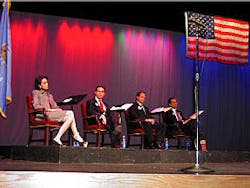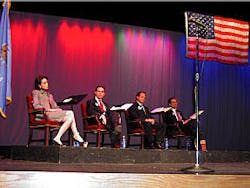The energy forum
The call for a national energy policy has been echoed about the US countryside for many years. Everyone agrees there is a need for one, but building a consensus on what it should consist of and then taking action has been another thing. Too often our representatives to Washington, DC, are uninformed, misinformed, tied closely to knee-jerk antioil groups, or a combination of the above.
Many people believe the trick is to find out where political candidates stand on energy issues, educate those who are open to it, and filter out those who don't pass muster.
Taking action
A group of petroleum industry organizations in Tulsa recently came up with a way to get politicians to think seriously about energy matters and take public positions before they are elected.
The Tulsa group, which is made up of such organizations as the Tulsa Geological Society, American Association of Petroleum Landmen, Energy Advocates, Society of Petroleum Engineers, American Association of Petroleum Geologists, Desk & Derrick Club, and the National Energy-Environment Law & Policy Institute, decided to hold an energy forum to let would-be representatives explain their views on energy subjects vital to Oklahoma and the nation.
The Tulsa-area congressional seat will be open early in 2002, and several people are applying for the job. Candidates were invited to appear before an interested and knowledgeable audience to answer a set of presubmitted questions on energy. Four candidates took the committee up on the offer. There were 18 questions concerning federal regulations, federal tax policy, federal spending on R&D, and general knowledge of energy issues.
No easy ones
The questions were presented by a panel of members from the sponsoring organizations plus a student from the high school hosting the forum. Each candidate was given 2 min to respond to each question. Here is a typical question:
"Federal tax policy impacts the domestic energy supply. Congressman Largent [the district's retiring representative] introduced several tax reform measures in HR 4 that would impact the energy industry. What tax reform proposals do you support that you believe will help the US meet its ongoing energy needs?"
Obviously, each of the four candidates had to do a bit of research. Even in an oil state where you are reasonably assured of a sympathetic ear in Congress, representatives still need to understand the issues. An uninformed congressman-even if he is on your side-will be of little help.
The forum lasted almost 2 hr. One after another, question after question, the candidates stepped forward and showed that they had actually done their homework and understood the topics. The result was better-informed political candidates, with their positions on issues placed on the record.
Will the forum concept work outside the oil-friendly states? Who knows. But putting political candidates into a situation in which they have to take informed public positions on energy is good for the public, good for the industry, and badly needed for the country.
The idea can't hurt anyone. Except for maybe a few antienergy demagogues.

